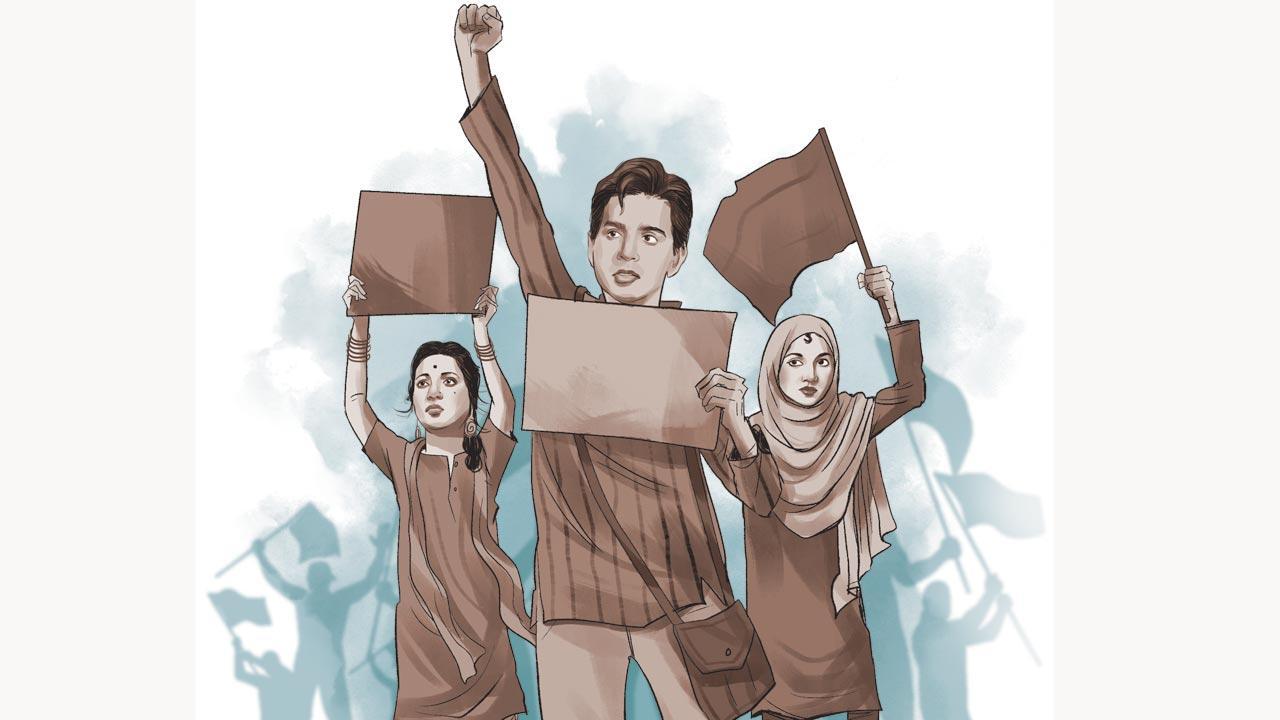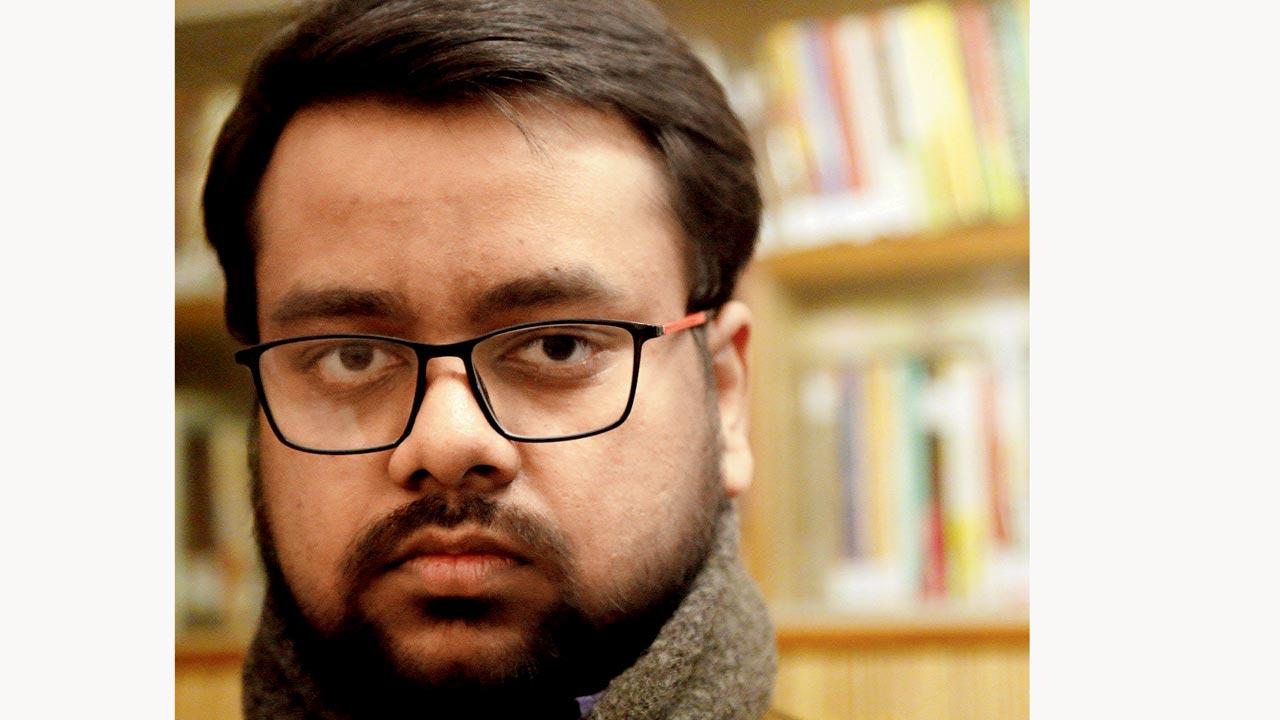A modern-day reimagining of Saratchandra’s story of doomed love, set in our turbulent world of ideological and societal clashes, gives voice to its female protagonists while questioning the morality and intent of its much-romanticised ‘hero’

Illustration/Uday Mohite
I was going to write an out-and-out romance but it took its own shape,” author-screenwriter Aayush Gupta tells us about his new subversive contemporary retelling of Saratchandra Chattopadhyay’s Devdas, titled My Name is Not Devdas (HarperCollins Publishers India). The defiance obvious in the title seeps through the text where the name serves not to identify its central male character but to hide his identity. “I gave up the idea of doing it as a faithful adaptation because the original is so good and has everything,” says Gupta, citing its universal themes of death, doomed love and heartbreak as reasons for its multiple adaptations over the years and endless appeal across different generations. Even while adhering to those broad themes, he wanted his version to evoke our fraught present. “I wanted to take the names, wanted to take the basic structure of one guy and two girls and tell a different story set in our times and relevant to our times.”
Gupta’s novel, his second after political thriller, Toppers, finds itself in the volatile student world of university campuses in Delhi where differing political ideologies and caste and class disputes determine and dictate its central doomed love triangle. While a yellowing, stolen library copy of Saratchandra’s Devdas that a character reads in the book sustains the link with the original, Gupta’s retelling places its chief conflict elsewhere. He explains that while in the original, it was external forces such as family and society that doomed Devdas’s relationship with Paro. “Here, the conflict is internal; the focus is on what they believe, what baggage they carry from their places of origin and what political upheavals and migrations they have witnessed.” What differentiates the work from a run-of-the-mill romance, he insists, is the presence of conflicts other than those pertaining to the relationships. “You are fighting one battle with the person that you are in love with, but in reality, there are so many other battles that you are fighting alongside—you are trying to find out who you are and what you believe in. These questions take centre stage in the lives of each of these characters.”
 Aayush Gupta
Aayush Gupta
In his modern-day reimagining of that celebrated story of destructive love then, Paro and Chandramukhi undergo deeper explorations as Gupta feels the original did not offer much from their points of view. “Because the story and its characters are well-known, I could experiment with the form to see that if Paro and Chandramukhi have equal weightage, an equal amount of say, would that change the story or experinece? Does Devdas now come out not looking like a hero, because he actually wasn’t one?” shares Gupta. Each of its three main characters is given their own chapters and voice to tell their story.
There is Jamia law student Paro, who comes from a poor community of muddha-makers (bamboo stool) in Haryana. Saved from poverty and perhaps death by Devdas’s father Narayan Mukherjee, she now feels indebted to him, and is unable to express her love for his son. Gupta shares that while shooting a documentary on rural handicrafts for Doordarshan a few years ago, he travelled to Farrukhnagar in Haryana to see the work of the muddha craftsmen. The experience, he says, helped to lend context to his female protagonist. The book’s Chandramukhi, a Kashmiri Muslim whose father was accused of being a terrorist, shows herself to be its oldest, wisest and most balanced character. She has been on the run since she was a child, her mother’s and her struggle for survival bringing them into a life of sex work. In contrast to the more sheltered Devdas and Paro, she has seen life and intends to live it. As she asserts in the novel, “I’ve seen too much of right and wrong, black and white, Right and Left; people refusing to walk the tightrope in the middle, afraid that they’ll fall on the wrong side. Yet, I have also seen a Nepali, a Bangladeshi, a Kashmiri, a Sikh, and a Hindu live in the same house, work for the same pimp—united by the fact that each of them needed to eat, and by their willingness to get scre**d every day to be able to.”
But it is in the creation of his eponymous character that Gupta is at his most critical. A slam poet masquerading as a feminist and a woke liberal, Devdas enjoys the popularity and attention that comes from being on the right side of the political dialogue but is the complete opposite in his actions. “He tries to control Paro and judges Chandramukhi—in this, he is similar to the original Devdas, but he is worse because he claims to be the opposite,” says Gupta, sharing that he had witnessed during his own student days similar people who were raging feminists on social media and shockingly misogynistic in private. The book’s Chunnilal is similarly deceitful, a blogger who masquerades as the people he writes on.
“This book is primarily a reflection of its times. Every author is affected by what they read or hear about what is happening around them,” Gupta says. Saratchandra Chattopadhyay’s Devdas, he points out, had a small scene portraying Devdas hitting Paro, but as a writer working in our increasingly violent present, he says he is more accustomed to hearing about acid attacks perpetrated by someone scorned. “Elements like these [in the book] have been informed by what I have seen and read alongside the political upheavals of our time which have sparked the book’s theme of whether differing political ideologies ultimately affect our relationships
with friends, lovers and family members.”
 Subscribe today by clicking the link and stay updated with the latest news!" Click here!
Subscribe today by clicking the link and stay updated with the latest news!" Click here!










